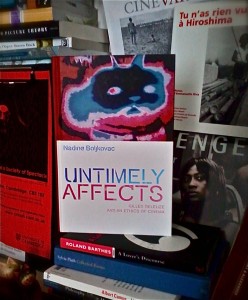
‘A Secret Called Happiness’:
Cinema of Ethics, Ethics of Cinema
‘And then the earth, present to the point of filming it up close, at root level. How many times do the characters confront the earth, the mud, the original clay of which they were made, from which they seem not yet to be free, and chose to bury themselves in it’. (Marker, One Day in the Life of Andrei Arsenevich, 1999)
‘Here we catch a glimpse of a future in which all mysteries are resolved. [. . .] this will come about because these readers, each working on his slice of universal memory, will lay the fragments of a single secret end to end, a secret with a beautiful name, a secret called happiness.’ (Resnais with ‘Chris and Magic Marker’, et al., 1956)
‘Forensic medicine,’ Claire Colebrook observes, ‘has its own functions and styles of inhuman observation.’ Prior to the 2015 paperback re-release of Untimely Affects, this presentation draws upon the text to undertake its own process of excavation and observation. It casts its gaze at relations between cinema and life – ethics, time and future, demarcations between material bodies (chemical, biological, social or political), and the production of affects – to speak of the unspeakable, ineffable, imperceptible and unthinkable.
Via traces that Chris Marker and Alain Resnais have left, ‘traces with which one can work, and contours to help draw up the map’ (Marker), this talk grasps at an interconnectedness among all assemblages of life, human and otherwise, to consider memory fragments in terms of the geography of a nomadic subjectivity. Such is to contemplate ‘the eternity of the lifeforces, not the perennity of death’ (Rosi Braidotti). Through multiple filmic excerpts and close readings, the talk will encounter foldings and doublings that engender subjectivities beyond the human. The excerpts will aid in an analysis of ‘beauty’ and an exploration of ways for seeing and thinking beyond destruction and extermination.
As it thereby attempts to trace what is beautiful and intangible, what is not in fact a ‘what’ but rather this, thisness, sign or ‘trigger’ (Steven Shaviro), the talk will obsess over ‘things that quicken the heart’ (Marker) … while questioning how temporal perceptions and sensations, as glimpsed through the moving image, affect ‘our’ perceptions, environments, and planet.
– Nadine Boljkovac
‘To think is to reach a non-stratified material, somewhere between the layers, in the interstices. Thinking has an essential relation to history, but it is no more historical than it is eternal. It is closer to what Nietzsche calls the Untimely: to think the past against the present—which would be nothing more than a common place, pure nostalgia, some kind of return, if he did not immediately add: “in favor, I hope, of a time to come”.’ (Two Regimes of Madness: Texts and Interviews 1975-1995, Deleuze)
Nadine Boljkovac (PhD, Cambridge) is Postdoctoral Fellow of Visual Culture & the Moving Image, Centre for Modernism Studies, UNSW. She was the Brown University 2012-13 Carol G. Lederer Postdoctoral Fellow, a University of Edinburgh 2010 Postdoctoral Fellow, and University of Aberdeen 2009-10 Film Teaching Fellow. Untimely Affects: Gilles Deleuze and an Ethics of Cinema (Edinburgh University Press, 2013) will be released in paperback in 2015. A second monograph in progress, Beyond Self and Screen, explores filmic instances of women’s self-portraiture.
